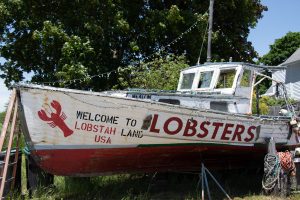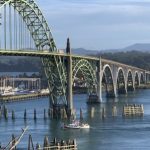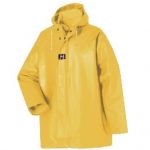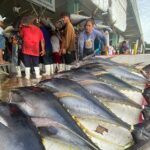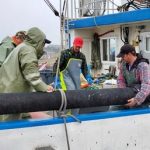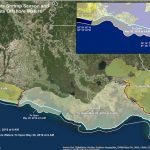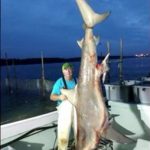Daily Archives: October 8, 2015
Trans-Pacific Partnership good news for Nunavut’s fishing industry
Stakeholders in the Nunavut fishing industry say the Trans-Pacific Partnership is a win for the territory, as it will open the industry to more markets. “Overall it is good news,” says Bill Mackay, the Nunavut government’s acting assistant deputy minister of intergovernmental affairs. The massive trade deal between 11 countries was signed this week, making headlines as a possible threat to Canada’s manufacturing and dairy sectors. In Nunavut, the fishing industry is heralding the agreement as a good news story. Read the rest here 19:21
Fishery the ‘economic giant’ of the province, says FFAW leader
 Just weeks before Newfoundland and Labrador’s provincial election, the fisheries union is starting a campaign to promote rural issues. The campaign is called Rural Works, and it is focused on the importance of the fishery to rural towns around the province. “The reason we were settled here is because of the fishery. The reason we remain here is because of the fishery,” said Fish, Food and Allied Workers president Keith Sullivan at a news conference Thursday. “It remains a primary economic driver …worth over $1 billion to our province. We think it can be worth much more,” said Sullivan. Read the rest here 19:09
Just weeks before Newfoundland and Labrador’s provincial election, the fisheries union is starting a campaign to promote rural issues. The campaign is called Rural Works, and it is focused on the importance of the fishery to rural towns around the province. “The reason we were settled here is because of the fishery. The reason we remain here is because of the fishery,” said Fish, Food and Allied Workers president Keith Sullivan at a news conference Thursday. “It remains a primary economic driver …worth over $1 billion to our province. We think it can be worth much more,” said Sullivan. Read the rest here 19:09
Commission calls for proposals to spend 2012 Salmon Federal Fishery Disaster funds
The Pacific States Marine Fisheries Commission is asking for proposals on how to spend $2.2 million in federal disaster funds geared towards salmon research in Cook Inlet and the Yukon-Kuskokwim region. The funding opportunities will be welcome in wake of state budget cuts that claimed the Chinook Salmon Research Initiative. Randy Fisher, the commission’s executive director, said the total amount will be split between six different areas of study, with each study receiving between $20,000 and $400,000. Because the disasters were declared for Cook Inlet and the Arctic-Yukon-Kuskokwim region in 2012, the research projects will focus in the same areas. Read the rest here 14:57
is asking for proposals on how to spend $2.2 million in federal disaster funds geared towards salmon research in Cook Inlet and the Yukon-Kuskokwim region. The funding opportunities will be welcome in wake of state budget cuts that claimed the Chinook Salmon Research Initiative. Randy Fisher, the commission’s executive director, said the total amount will be split between six different areas of study, with each study receiving between $20,000 and $400,000. Because the disasters were declared for Cook Inlet and the Arctic-Yukon-Kuskokwim region in 2012, the research projects will focus in the same areas. Read the rest here 14:57
After 83 years, West Coast Wet Fish Processor, State Fish, to close doors
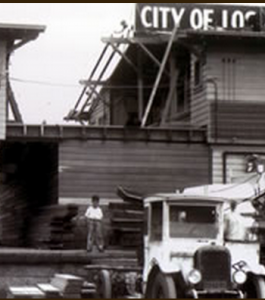 Eighty-three-year-old US wet fish catcher and processor State Fish will close its doors in the near future after a family dispute and unsuccessful restructuring effort has turned into a liquidation of the company’s remaining assets. Difficult conditions in the wet fish industry in recent years have compounded the company’s problems. Tough times were exacerbated by the family litigation. John, who owned the land for one of the company’s facility’s raised the rent of the State Fish’s plant by 50% in 2005, and — following the company’s objection to the rent increase — proceeded to attempt to evict the company from the plant. Read the rest here 13:39
Eighty-three-year-old US wet fish catcher and processor State Fish will close its doors in the near future after a family dispute and unsuccessful restructuring effort has turned into a liquidation of the company’s remaining assets. Difficult conditions in the wet fish industry in recent years have compounded the company’s problems. Tough times were exacerbated by the family litigation. John, who owned the land for one of the company’s facility’s raised the rent of the State Fish’s plant by 50% in 2005, and — following the company’s objection to the rent increase — proceeded to attempt to evict the company from the plant. Read the rest here 13:39
American Samoa: Two alia pass Coast Guard safety inspections
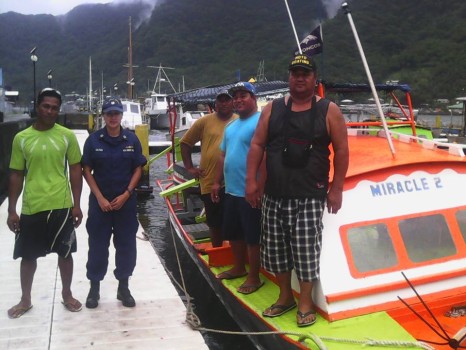 Two alia fishing boats are the first to pass safety inspections by the US Coast Guard and have been issued decals that show their compliance with US Coast Guard rules. The safety decals are good for 5 years. Three alias were inspected but one did not meet the complete list to pass the US Coast Guard’s decal inspection.After October 15, any vessel that travels out three miles must have the safety decal or they will be ordered back to port and not be allowed out until they have passed the Coast Guard inspection. Read the rest here 10:02
Two alia fishing boats are the first to pass safety inspections by the US Coast Guard and have been issued decals that show their compliance with US Coast Guard rules. The safety decals are good for 5 years. Three alias were inspected but one did not meet the complete list to pass the US Coast Guard’s decal inspection.After October 15, any vessel that travels out three miles must have the safety decal or they will be ordered back to port and not be allowed out until they have passed the Coast Guard inspection. Read the rest here 10:02
It’s not overfishing – The stock is mismanaged and mismanaging still occurring.
 “Overfishing” or “overfished” are terms used when, for any reason, the stock level of a species of fish is not at a sustainable level. It doesn’t matter what the cause. Theses terms have legal and scientific meaning. There are many things that could go wrong. The obvious one is the stock does not grow as fast as scientists think because of environmental conditions, lack of food, other competing species, incorrect scientific fish growth models, incorrect stock level data, incorrect growth rates or incorrect natural mortality rates. The fishermen are not the cause of the failure of these fishery management plans. Read the rest here 09:07
“Overfishing” or “overfished” are terms used when, for any reason, the stock level of a species of fish is not at a sustainable level. It doesn’t matter what the cause. Theses terms have legal and scientific meaning. There are many things that could go wrong. The obvious one is the stock does not grow as fast as scientists think because of environmental conditions, lack of food, other competing species, incorrect scientific fish growth models, incorrect stock level data, incorrect growth rates or incorrect natural mortality rates. The fishermen are not the cause of the failure of these fishery management plans. Read the rest here 09:07
New Hampshire’s U.S. Rep. Frank Guinta calls for NOAA to stop at-sea monitoring or pay for it
 U.S. Rep. Frank Guinta’s bill would exempt fishermen from having to “comply with the independent, third-party monitoring program” required by the NOAA unless the federal fisheries regulator “fully funds the program with funds appropriated from the administration.” Guinta also questioned why the at-sea monitoring is so expensive and why NOAA contracts the services out to third-party operators rather than performing the tasks with its own staff. “It’s just too cozy,” Guinta said Wednesday. “It’s blatantly unfair to the fishermen and appears to be an excessive amount being charged to taxpayers.” Read the rest here 08:30
U.S. Rep. Frank Guinta’s bill would exempt fishermen from having to “comply with the independent, third-party monitoring program” required by the NOAA unless the federal fisheries regulator “fully funds the program with funds appropriated from the administration.” Guinta also questioned why the at-sea monitoring is so expensive and why NOAA contracts the services out to third-party operators rather than performing the tasks with its own staff. “It’s just too cozy,” Guinta said Wednesday. “It’s blatantly unfair to the fishermen and appears to be an excessive amount being charged to taxpayers.” Read the rest here 08:30
Kerry: Obama looking to senators to make Atlantic monument happen
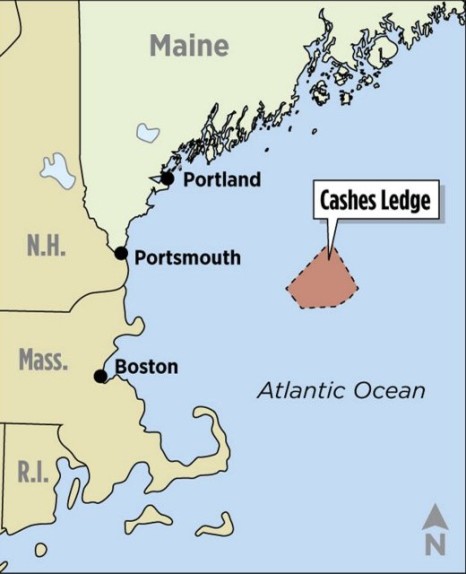 Speaking at the Our Oceans Conference in Valparaiso, Chile, Kerry followed a reference to the newly created sanctuaries off the coast of Maryland and along the Great Lakes coast of Wisconsin, by saying “We also have plans in the works which we are pursuing for still another significant one in the Atlantic, where we don’t have the kind of presence that we want and should.” Kerry added that the Obama administration is working with senators “engaged in that particular area in order to make that happen.” That seemed to toss the ball squarely back into the court of, among other New England senators, Elizabeth Warren and Edward J. Markey, both of whom have been silent on the issue. Read the rest here 08:04
Speaking at the Our Oceans Conference in Valparaiso, Chile, Kerry followed a reference to the newly created sanctuaries off the coast of Maryland and along the Great Lakes coast of Wisconsin, by saying “We also have plans in the works which we are pursuing for still another significant one in the Atlantic, where we don’t have the kind of presence that we want and should.” Kerry added that the Obama administration is working with senators “engaged in that particular area in order to make that happen.” That seemed to toss the ball squarely back into the court of, among other New England senators, Elizabeth Warren and Edward J. Markey, both of whom have been silent on the issue. Read the rest here 08:04






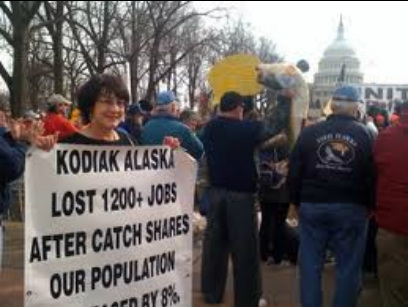 Since the 1980s, BC’s commercial fleet has shrunk by 60%. The number of fishermen is down by 70%. Licence and vessel ownership has shifted from individuals to companies; from rural to urban areas. “Armchair fishermen” pocket as much as 75% of fisheries’ landed value, money that should be going to the fishermen who earn it. Once-vibrant coastal communities are in steep declines, as hundreds of millions of dollars are drawn out from the coast by quota leasing.
Since the 1980s, BC’s commercial fleet has shrunk by 60%. The number of fishermen is down by 70%. Licence and vessel ownership has shifted from individuals to companies; from rural to urban areas. “Armchair fishermen” pocket as much as 75% of fisheries’ landed value, money that should be going to the fishermen who earn it. Once-vibrant coastal communities are in steep declines, as hundreds of millions of dollars are drawn out from the coast by quota leasing. 


























